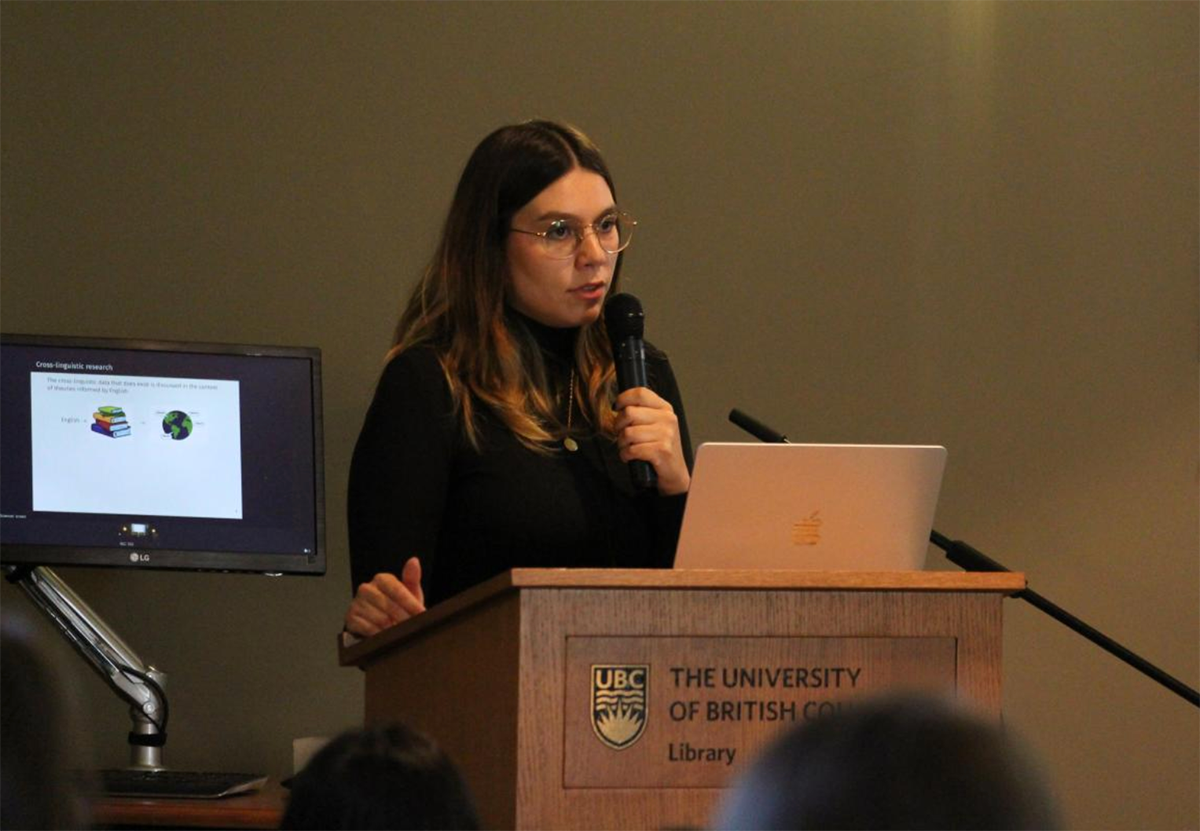

October marks Latin American Heritage Month in Canada—an opportunity to celebrate and recognize the Latin American community and their contributions to Canadian society.
Some of the Arts faculty affiliated with the Latin American Studies (LAS) program share their research and teaching as it relates to Latin American Studies, what the program offers to students, and what they see as the most significant shared histories or futures of Latin America and Canada.


Dr. Ramón (Arturo) Antonio Victoriano-Martinez
Assistant Professor of Spanish,
Department of French, Hispanic and Italian Studies
How do you facilitate anti-racist and decolonizing education in the classroom as it relates to Latin American Studies?
Although my main area of specialization is the Hispanic Caribbean, I have been teaching in the Latin American Studies program since I joined UBC in 2019. I aim to introduce students to original sources that center marginalized or overlooked people as subjects or authors, as well as critically engaging with traditional authors and arguments, situating them in their historical context and looking at them with a more contemporary gaze.
What excites you about the Latin American Studies program? How can students benefit from enrolling?
I am very excited about the multidisciplinary nature of the Latin American Studies program at UBC. Students that enroll in it will gain a thorough understanding of a vast region with growing ties to Canada through commerce, politics, and culture.
What are some helpful resources we (the UBC community) should use to learn more about Latin American history and culture?
Exploring the vast collection of Latin American content in our libraries, from books to music to movies, and attending the series of wonderful events organized by the Latin American Studies program.


Dr. Benjamin Bryce
Associate Professor, Department of History;
Chair, Latin American Studies
Can you briefly describe your research on Latin American history and/or culture?
I am a historian of migration in the Americas, with a particular focus on Argentina. In the coming year, I hope to finish writing Grounds for Exclusion: Immigration, Race, Health, and Gender in Argentina, 1876-1940. The book analyzes the range of ways that bureaucrats and politicians developed both formal and informal methods to exclude. Alongside concerns about race, unmarried women, people with disabilities, and workers in ill health were also prevented from boarding ships bound for Buenos Aires, denied entry to the country, or excluded from the social and civic rights afforded to most other immigrants.
There are many commonalities that bridge Latin America and Canada. In your opinion, what are the most significant shared histories, issues, opportunities, or futures?
The histories of the Americas are deeply connected. Canadians eat food produced in Latin America and shipped to us daily. Canadians’ pursuit of low prices in food and many other sectors have an impact on workers and landscapes in many parts of Latin America. Similar things can be said about millions of Canadian holidaymakers who travel to resorts in the Caribbean and Mexico.
The policies and practices of the British, French, Spanish and Portuguese Empires and the nation-states that grew out of those imperial formations created many similarities. European newcomers took land and resources, and stripped Indigenous peoples of language and ways of knowing that differed from European worldviews. Similar histories of slavery also connected regions of the Americas, and while Canada did not have widespread plantation agriculture, it directly benefited from slavery and its legacies through trade and investments, particularly in the British Caribbean.
What excites you about the Latin American Studies program? How can students benefit from enrolling?
It’s a wonderfully open program that encourages students to study in many UBC departments while gaining knowledge and expertise about an important area of the world, one deeply connected to Canada. As a minor or double major, LAS also allows students to double-count as many as 9 credits from their other major, thereby making it relatively easy to get this regional, interdisciplinary specialization alongside another traditional discipline.


Dr. Tamara Mitchell
Assistant Professor of Spanish,
Department of French, Hispanic and Italian Studies
Can you briefly describe your research on Latin American history and/or culture?
I just wrapped up a book on neoliberal aesthetics in contemporary Mexican and Central American literature, which considers novels whose finance-driven plots represent and critique neoliberal logic and processes. Now I’m turning my attention to a new project on the role of sound and listening in literary texts. That research looks at works that perk up our ears as a means of drawing attention to distinct crises and forms of violence in Latin America.
Lastly, I’m doing exploratory research on the literature and culture of Latinocanadá, a term coined by Hugh Hazelton to describe the Latin American diaspora in Canada. There is a vibrant and active community of Canadian artists and authors with roots in Latin America, and their output is quite distinct from that of the more-studied Latinx community in the United States.
There are many commonalities that bridge Latin America and Canada. In your opinion, what are the most significant shared histories, issues, opportunities, or futures?
Beyond a shared history of colonialism and the complicated legacy that entails, Latin America and Canada are regional partners in terms of trade agreements and multilateral relations, have major ties due to diaspora groups and seasonal workers, and confront similar geopolitical challenges due to proximity to the United States. One major challenge that I often touch on in my classes is Canada’s role in mining in Latin America. Canadian-owned mining companies are among the largest in the world, and their presence in Latin America has major effects on the human and more-than-human world. On the flip side, Latin America has led efforts to recognize the humanity and rights of non-human beings, such as the land and rivers. With Canada’s (and BC’s in particular) commitment to renewable energy, there is potential for a meaningful partnership.
What are some helpful resources we (the UBC community) should use to learn more about Latin American history and culture?
Beyond the fantastic events of LAS, the Spanish Program in FHIS hosts dynamic activities in both English and Spanish. The Vancouver Latin American Cultural Centre is one of my favourite community organizers. They sponsor concerts, dance lessons, monthly readings groups, and other cultural initiatives for folks interested in learning about Latin American culture or members of the diaspora seeking to connect with their Latin American roots. There are two annual film festivals worth checking out: the Vancouver Latin American Film Festival and the Vancouver International Film Festival.


Dr. Felipe Valencia Caicedo
Assistant Professor,
Vancouver School of Economics
Can you briefly describe your research on Latin American history and/or culture?
I work at the intersection of economic history and economic development, understanding how events in the past (such as colonization and conflict) still influence economic outcomes in the present. For instance, I have looked at the role of religious missionaries in Latin America, the impact of conflict in Paraguay, Laos and Spain, as well as the important role of slavery in determining income distributions in Brazil. I am currently editing a book collecting the experience of Latin American countries in grappling with their complex and rich history.
What excites you about the Latin American Studies program? How can students benefit from enrolling?
LAS is very multidisciplinary—it is an opportunity to look at Latin America through different and complementary perspectives. One is through the lenses of economics and history, but there are so many others. Students can also approach the region thematically, to study transdisciplinary topics such as race, inequality and gender. I strongly recommend students to become fluent in one of the languages spoken in the region in order to be able to immerse more fully into its culture and history. I also highly recommend visiting a Latin American country in order to better understand its unique reality. There is really no substitute to such experiences.
“Regardless of their interests, chances are that students will encounter a facet of study in LAS that they will feel really passionate about, not only enriching their academic experience, but also fulfilling them at a deeper personal level.”
What are some helpful resources we (the UBC community) should use to learn more about Latin American history and culture?
I am an avid reader of Latin American literature, where I can highly recommend the writers of the so-called ‘Latin American Boom’. People like Garcia Marquez, Vargas Llosa, Cortázar and Fuentes. There is also a very rich film tradition that extends from Cuba, Argentina and Brazil. I recommend City of God, Memories of Underdevelopment or The Secret in Their Eyes, to hear directly the voices of Latin Americans.


Dr. Maria Carbonetti
Lecturer of Spanish,
Department of French, Hispanic and Italian Studies;
Director, Spanish for Community
How do you facilitate anti-racist and decolonizing education in the classroom as it relates to Latin American Studies?
In both the 3rd and 4th year Spanish language and culture courses I coordinate, as well as in Spanish for Community projects, our fundamental pillars revolve around those matters as well as social justice and human and earth rights. In one current project, “Palabras Madres/Mother Words: Bridging Peoples and Territories Through Poetry by Indigenous Writers from the Patagonia (Argentina) and the Araucania (Chile) in Translation (Mapuzugun-Spanish-English),” students are embarking on a profound exploration of poetry in both the Mapuche language and Spanish, guided by members of the Indigenous Mapuche communities. The project also includes the participation of Canadian Indigenous artists and scholars, with the aim of helping both students and instructors make connections between the transnational historical legacies and contemporary consequences of colonialism.
There are many commonalities that bridge Latin America and Canada. In your opinion, what are the most significant shared histories, issues, opportunities, or futures?
Latin America and Canada share crucial commonalities related to colonialism, indigenous issues, and the utilization of natural resources. Indigenous peoples in Latin America and Canada continue to seek recognition of their rights, land claims, and cultural preservation, and in both geopolitical areas they suffer intergenerational poverty and trauma.
In terms of natural resources, both regions have been and are today heavily exploited by colonial and post-colonial powers. In the contemporary era, the exploitation of natural resources remains a contentious issue in both regions, with environmental concerns and Indigenous rights intersecting as critical challenges.
What excites you about the Latin American Studies program? How can students benefit from enrolling?
The program offers a deep dive into the rich and diverse cultures, histories, and socio-political landscapes of Latin America. This often includes opportunities for immersive experiences such as study abroad programs, internships, and community engagement projects, providing students with real-world exposure to Latin American contexts.
LAS not only broadens one’s horizons but also equips students with a global perspective, intercultural competence, and analytical skills that are increasingly valued in today’s interconnected world. Whether pursuing careers in diplomacy, international business, academia, or social justice advocacy, the insights gained from this program are invaluable in navigating the complexities of our globalized society.


